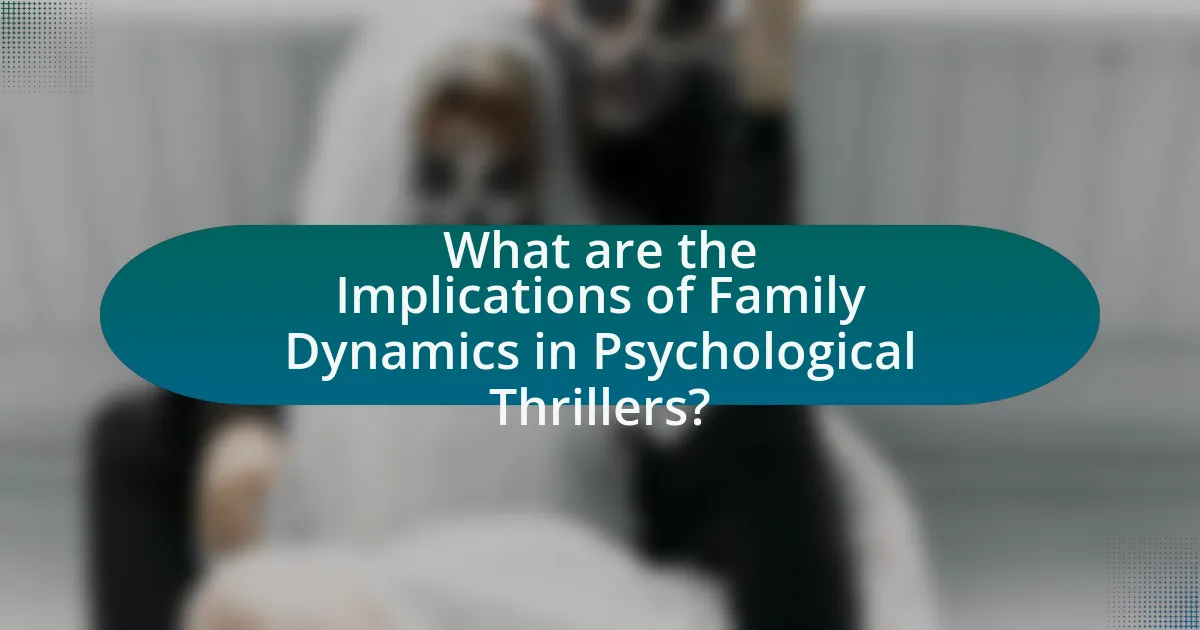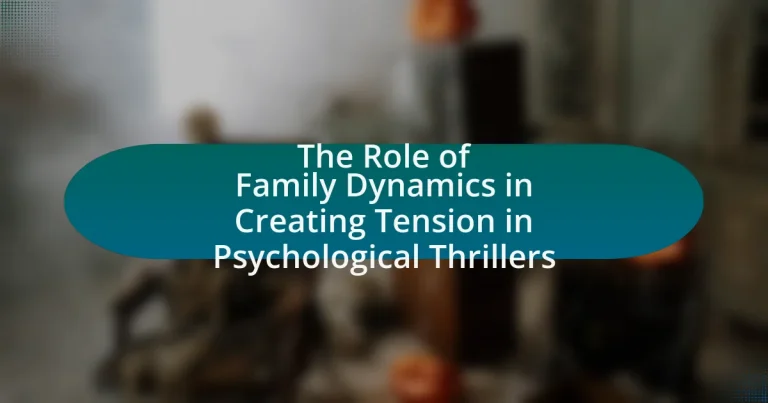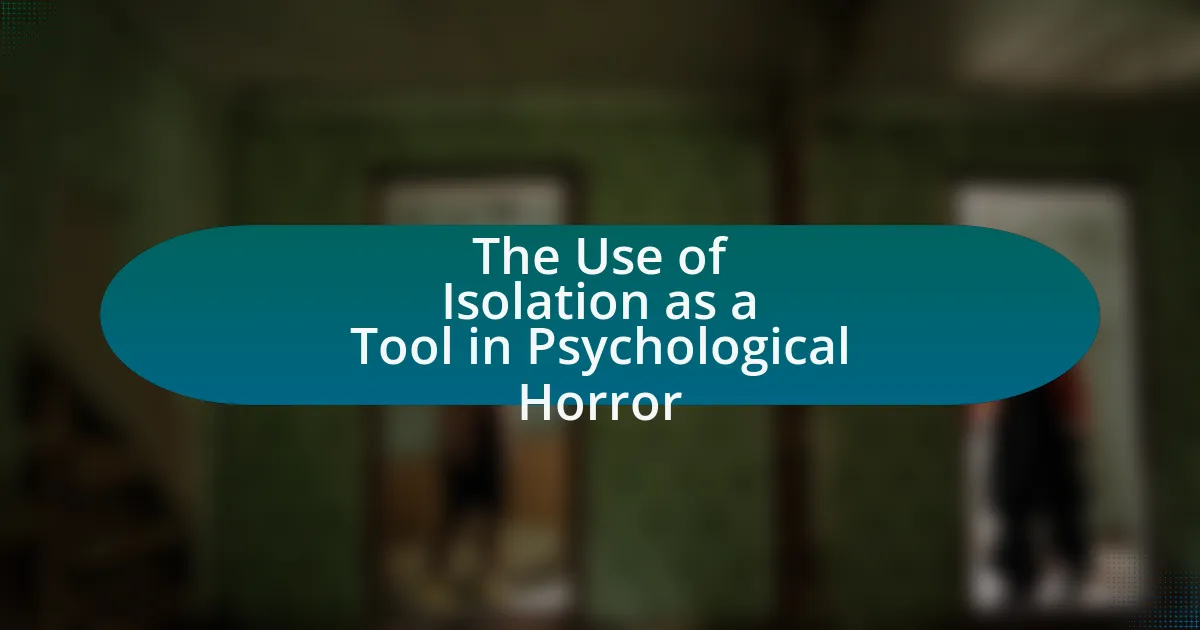The article examines the role of family dynamics in creating tension within psychological thrillers. It highlights how complex interactions among family members, including themes of betrayal, loyalty, and hidden secrets, drive narrative conflict and suspense. The discussion includes the influence of family relationships on character development, the types of family structures commonly depicted, and the psychological theories that explain the impact of family on individual behavior. Additionally, it explores how unresolved conflicts and familial roles contribute to the overall tension in these narratives, emphasizing the significance of family dynamics in enhancing the emotional stakes and suspense of psychological thrillers.

What are Family Dynamics in Psychological Thrillers?
Family dynamics in psychological thrillers refer to the complex interactions and relationships among family members that drive the narrative and create tension. These dynamics often include themes of betrayal, loyalty, and hidden secrets, which can lead to conflict and suspense. For instance, the portrayal of dysfunctional families, where members may harbor resentment or jealousy, serves to heighten emotional stakes and engage the audience. This is evident in works like “Gone Girl” by Gillian Flynn, where the marriage dynamics between the protagonists reveal deep-seated issues that propel the plot forward. Such intricate family relationships are essential in establishing the psychological tension that characterizes the genre.
How do family relationships influence character development in psychological thrillers?
Family relationships significantly influence character development in psychological thrillers by shaping motivations, conflicts, and psychological complexities. Characters often exhibit traits and behaviors that stem from their familial interactions, such as loyalty, betrayal, or trauma, which drive the narrative tension. For instance, a character’s strained relationship with a parent may lead to feelings of inadequacy or a quest for approval, impacting their decisions and actions throughout the story. This dynamic is evident in works like “Gone Girl” by Gillian Flynn, where the protagonist’s relationship with her parents contributes to her manipulative behavior and the unfolding psychological tension. Such relationships serve as a catalyst for character evolution, revealing deeper psychological layers and enhancing the overall suspense of the thriller.
What types of family structures are commonly depicted in these narratives?
Commonly depicted family structures in psychological thrillers include nuclear families, single-parent households, and dysfunctional families. Nuclear families often serve as the central unit, highlighting the tension between family members, while single-parent households can emphasize isolation and vulnerability. Dysfunctional families frequently create conflict and suspense, showcasing issues such as abuse, betrayal, or mental illness, which are pivotal in driving the narrative forward. These structures are essential in establishing the psychological tension that characterizes the genre, as they reflect real-life complexities and emotional struggles.
How do familial roles contribute to the tension in the story?
Familial roles contribute to the tension in the story by establishing conflicting expectations and responsibilities among family members. These roles often create power dynamics that lead to misunderstandings, resentment, and emotional conflict, heightening the overall suspense. For instance, a parent’s expectation for a child to succeed can clash with the child’s personal struggles, resulting in a volatile relationship that fuels the narrative tension. This interplay of familial obligations and individual desires serves as a catalyst for conflict, making the psychological stakes more intense and engaging for the audience.
Why are family dynamics essential for creating suspense?
Family dynamics are essential for creating suspense because they introduce complex relationships and emotional stakes that heighten tension. In psychological thrillers, the interplay between family members often reveals hidden secrets, conflicting motivations, and power struggles, which can lead to unpredictable outcomes. For instance, research by the American Psychological Association indicates that familial relationships significantly influence individual behavior and decision-making, making the stakes more personal and intense. This emotional investment in family ties amplifies the suspense, as audiences become more engaged with the characters’ dilemmas and the potential for betrayal or conflict within the family unit.
What psychological theories explain the impact of family on individual behavior?
Psychological theories that explain the impact of family on individual behavior include attachment theory, social learning theory, and family systems theory. Attachment theory, developed by John Bowlby, posits that early relationships with caregivers shape emotional and social development, influencing behaviors and relationships in adulthood. Social learning theory, proposed by Albert Bandura, emphasizes that individuals learn behaviors through observation and imitation of family members, which can lead to the internalization of both positive and negative behaviors. Family systems theory, articulated by Murray Bowen, suggests that individuals cannot be understood in isolation from their family unit, as family dynamics and interactions significantly influence individual behavior and mental health. These theories collectively illustrate how familial relationships and dynamics play a crucial role in shaping individual behavior.
How do unresolved family conflicts heighten tension in the plot?
Unresolved family conflicts heighten tension in the plot by creating an atmosphere of distrust and emotional volatility among characters. These conflicts often serve as a catalyst for character actions and decisions, leading to unpredictable outcomes that escalate the narrative tension. For instance, in psychological thrillers, the presence of hidden resentments or past grievances can trigger confrontations that reveal deeper psychological issues, thereby intensifying the stakes. This dynamic is evident in works like “The Shining” by Stephen King, where familial discord contributes to the protagonist’s unraveling, illustrating how unresolved issues can manifest in destructive behaviors and heighten suspense.

How do Family Dynamics Create Tension in Psychological Thrillers?
Family dynamics create tension in psychological thrillers by highlighting conflicts, secrets, and power struggles within familial relationships. These elements often lead to heightened emotional stakes, as characters grapple with loyalty, betrayal, and the fear of losing loved ones. For instance, the presence of a family member with a hidden agenda can create an atmosphere of mistrust, driving the narrative forward and keeping audiences engaged. Additionally, psychological thrillers frequently explore themes of mental illness or trauma within families, which can exacerbate tensions and lead to unpredictable outcomes. This interplay of complex relationships and emotional turmoil is essential in crafting suspenseful and gripping storylines.
What specific elements of family dynamics contribute to tension?
Specific elements of family dynamics that contribute to tension include communication breakdowns, differing values, and unresolved conflicts. Communication breakdowns often lead to misunderstandings and feelings of isolation among family members, which can escalate tensions. Differing values, such as contrasting beliefs about parenting or financial decisions, create friction and disagreements. Unresolved conflicts, whether from past grievances or ongoing issues, can fester and lead to heightened emotional responses, further intensifying the atmosphere within the family. These dynamics are frequently depicted in psychological thrillers, where the interplay of these elements drives the narrative tension and character development.
How does betrayal within a family amplify suspense?
Betrayal within a family amplifies suspense by introducing a profound emotional conflict that challenges trust and loyalty. This internal strife creates an unpredictable environment where characters may act irrationally, heightening tension as the audience anticipates potential consequences. For example, in psychological thrillers, familial betrayal often leads to unexpected plot twists, as seen in works like “Gone Girl” by Gillian Flynn, where the protagonist’s deceitful actions against her spouse create a web of suspenseful uncertainty. Such dynamics compel viewers to question the motives and reliability of characters, intensifying the overall suspense of the narrative.
What role does secrecy play in family relationships in these stories?
Secrecy serves as a catalyst for tension and conflict in family relationships within these stories. It creates an environment of mistrust and suspicion, often leading to misunderstandings and emotional estrangement among family members. For instance, hidden truths about past actions or relationships can surface, resulting in betrayal and a breakdown of communication. This dynamic is evident in psychological thrillers where characters grapple with the consequences of their concealed actions, illustrating how secrecy can distort familial bonds and escalate psychological distress.
How do different genres of psychological thrillers utilize family dynamics?
Different genres of psychological thrillers utilize family dynamics to create tension by exploring themes of betrayal, loyalty, and the impact of secrets within familial relationships. For instance, in domestic thrillers, the portrayal of a seemingly perfect family unraveling due to hidden truths amplifies suspense, as seen in works like “Gone Girl” by Gillian Flynn, where the protagonist’s marriage conceals dark secrets that lead to psychological manipulation. In horror-infused thrillers, such as “Hereditary,” family dynamics are exploited to evoke fear through generational trauma and the breakdown of communication, illustrating how familial bonds can become sources of horror. Additionally, in crime thrillers, the conflict between family loyalty and moral dilemmas often drives the narrative, as exemplified in “Prisoners,” where a father’s desperate actions to protect his family lead to ethical quandaries and escalating tension. These examples demonstrate how different genres leverage family dynamics to enhance psychological complexity and emotional stakes, ultimately heightening the overall tension in the narrative.
What are the differences between traditional and modern portrayals of family in thrillers?
Traditional portrayals of family in thrillers often depict a nuclear family structure characterized by clear roles, stability, and a sense of loyalty, while modern portrayals tend to explore more complex, dysfunctional family dynamics that emphasize conflict, ambiguity, and moral ambiguity. In traditional thrillers, families are typically shown as protective units facing external threats, reinforcing themes of unity and resilience. In contrast, modern thrillers frequently highlight internal strife, betrayal, and the psychological impact of family secrets, reflecting contemporary societal issues such as divorce, blended families, and mental health challenges. This shift in portrayal aligns with changing societal norms and the increasing recognition of diverse family structures, as seen in films like “Hereditary” and “The Others,” which focus on the darker aspects of familial relationships.
How do cultural backgrounds influence family dynamics in psychological thrillers?
Cultural backgrounds significantly influence family dynamics in psychological thrillers by shaping values, communication styles, and conflict resolution methods. For instance, in many Asian cultures, familial loyalty and respect for elders are paramount, which can create tension when characters face moral dilemmas that challenge these values, as seen in films like “Parasite.” Additionally, Western narratives often emphasize individualism, leading to conflicts that arise from personal desires versus family expectations, exemplified in works like “The Shining.” These cultural frameworks dictate how characters interact, react to crises, and ultimately contribute to the psychological tension that drives the narrative forward.

What are the Implications of Family Dynamics in Psychological Thrillers?
Family dynamics in psychological thrillers significantly influence character motivations and plot development. These dynamics often create tension through complex relationships, such as betrayal, loyalty, and hidden secrets, which drive the narrative forward. For instance, the portrayal of dysfunctional families can amplify feelings of mistrust and paranoia, as seen in works like “Gone Girl” by Gillian Flynn, where the protagonist’s relationship with her family becomes a pivotal element in the unfolding mystery. Additionally, research indicates that familial conflict can heighten emotional stakes, making the audience more invested in the characters’ fates. This interplay between family relationships and psychological tension is crucial in engaging viewers and enhancing the overall impact of the thriller genre.
How do family dynamics affect audience perception of characters?
Family dynamics significantly influence audience perception of characters by shaping their motivations, relationships, and moral complexities. For instance, characters from dysfunctional families often evoke empathy or disdain based on their backgrounds, which can lead to a deeper emotional engagement from the audience. Research by Cohen and Strayer (1996) indicates that viewers are more likely to relate to characters whose familial struggles mirror their own experiences, enhancing the psychological tension within the narrative. Additionally, the portrayal of family interactions can create a framework for understanding characters’ actions, as seen in psychological thrillers where familial loyalty or betrayal drives the plot. This connection between family dynamics and character perception is crucial in eliciting emotional responses and maintaining audience investment in the story.
What makes a family dynamic relatable or unsettling for viewers?
A family dynamic becomes relatable for viewers when it reflects common experiences, emotions, and conflicts that resonate with their own lives. This relatability often stems from shared values, struggles, and the portrayal of authentic relationships, which can evoke empathy and understanding. Conversely, a family dynamic can be unsettling when it showcases extreme dysfunction, secrets, or betrayal, creating a sense of discomfort and tension. For instance, psychological thrillers often depict families with hidden agendas or unresolved trauma, which can amplify feelings of anxiety and fear among viewers. The contrast between normalcy and chaos in these dynamics heightens emotional engagement, making the narrative both compelling and disturbing.
How do family dynamics shape the moral dilemmas faced by characters?
Family dynamics significantly shape the moral dilemmas faced by characters by influencing their values, loyalties, and conflicts. For instance, characters often grapple with competing obligations to family members versus their own ethical beliefs, leading to complex decisions that reflect familial expectations. Research indicates that familial relationships can create pressure to conform to certain moral standards, which may conflict with personal integrity, as seen in psychological thrillers where characters must choose between loyalty to family and doing what is right. This tension is exemplified in narratives where familial ties compel characters to engage in morally questionable actions to protect loved ones, illustrating how family dynamics can complicate ethical decision-making.
What lessons can be learned from the portrayal of family dynamics in psychological thrillers?
The portrayal of family dynamics in psychological thrillers teaches that complex relationships can drive conflict and tension. These narratives often highlight themes such as betrayal, loyalty, and the impact of secrets, illustrating how familial bonds can become sources of both support and strife. For instance, in films like “The Others,” the unraveling of family secrets creates a chilling atmosphere, demonstrating that hidden truths can lead to psychological unraveling. Additionally, studies show that dysfunctional family interactions can exacerbate stress and anxiety, as seen in the dynamics presented in “Hereditary,” where grief and unresolved issues manifest in destructive behaviors. Thus, psychological thrillers effectively use family dynamics to explore deeper psychological themes and societal issues.
How can understanding family dynamics enhance the viewing experience?
Understanding family dynamics enhances the viewing experience by providing deeper insights into character motivations and conflicts. When viewers grasp the complexities of relationships within a family, they can better appreciate the psychological tension that drives the narrative in thrillers. For instance, research indicates that familial relationships often serve as a catalyst for conflict, which is a central theme in psychological thrillers. This understanding allows audiences to engage more fully with the story, as they can anticipate character reactions and plot developments based on established family roles and histories. Consequently, a nuanced comprehension of family dynamics enriches the emotional impact and suspense of the viewing experience.
What strategies can writers use to effectively depict family dynamics in their thrillers?
Writers can effectively depict family dynamics in their thrillers by utilizing character backstories, conflict-driven interactions, and psychological depth. Character backstories provide context for familial relationships, revealing past traumas or secrets that influence current behavior. Conflict-driven interactions, such as arguments or betrayals, create tension and highlight the complexities of family ties. Psychological depth allows writers to explore the motivations and fears of family members, making their actions more relatable and impactful. For instance, in Gillian Flynn’s “Gone Girl,” the unraveling of the marriage between Nick and Amy Dunne showcases how hidden resentments and secrets can escalate into a thrilling narrative, illustrating the effectiveness of these strategies in creating suspense and tension.
What are best practices for analyzing family dynamics in psychological thrillers?
Best practices for analyzing family dynamics in psychological thrillers include examining character relationships, identifying underlying conflicts, and exploring themes of trust and betrayal. Analyzing character relationships reveals how familial bonds can create tension, as seen in narratives where loyalty is tested. Identifying underlying conflicts, such as generational differences or secrets, enhances understanding of motivations and actions. Exploring themes of trust and betrayal is crucial, as these elements often drive the plot and character development, exemplified in works like “Gone Girl” by Gillian Flynn, where family secrets lead to dramatic consequences.





